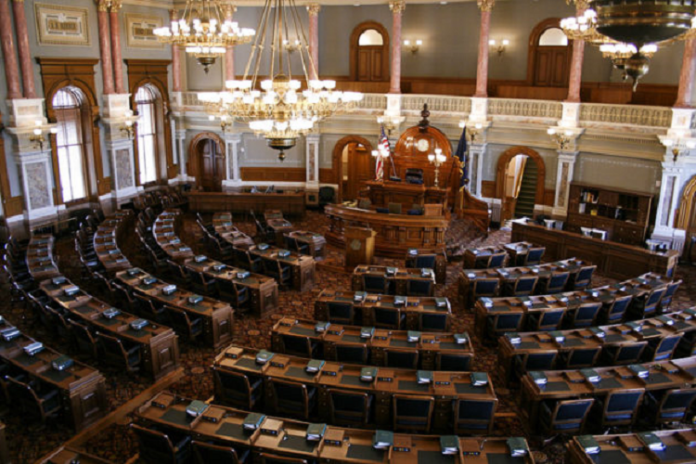(Updated to include final vote)
The Kansas House on Thursday approved a bill barring universities and community colleges from requiring statements about diversity, equity or inclusion as a condition of admission, financial aid or hiring.
The House voted 81-39 to approve the legislation that was advocated by Republican state Rep. Steven Howe of Salina, who said the measure was needed to protect free speech rights and academic freedom on college campuses.
The vote came up three votes short of being able to override any veto from the governor although three Republicans were absent didn’t vote.
Howe said that DEI had become part of how universities were screening applicants for jobs by asking about their experience working with people from diverse backgrounds and their commitment to diversity, equity and inclusion.
“As DEI has expanded, it has created tension,” Howe said. “Not only tensions for students and faculty, but also for prospective applicants wanting to gain employment at post-secondary institutions of higher education.
“These days, many colleges and universities require students and faculty to pledge their allegiance to a politicized understanding of diversity, equity and inclusion as a condition for admissions, hiring or promotions,” he said.
“Instead of a merit-based approach, universities have chosen to embrace ideologies that discriminate against people that do not adhere to their orthodoxy,” he said.
The bill, which also applies to technical colleges, bans schools from requiring pledges or statements regarding “diversity, equity, inclusion” as a basis for denying admission, financial aid, promoting a faculty member or hiring a job applicant.
Howe has said the bill doesn’t ban universities from spending money on DEI programs. He said it’s limited to using DEI in employment, admissions and financial aid decisions.
The legislation, as it passed out of committee, reduced the fines for potential violations to $10,000 for each violation from $100,000 per violation. It also removed a section that would have allowed anyone whose rights were violated to sue a school.
The bill now allows someone who believes their rights were violated to file a complaint with the Board of Regents to investigate.
If the board’s investigation doesn’t turn up a violation, a complaint could be filed with the attorney general, who would investigate.
If the attorney general finds a violation, that institution would have 90 days to remedy the violation.
If the violation is not corrected, the attorney general could take the school to court. A $10,000 fine for each violation could be levied if the court finds a violation.
Democrats called the bill an overreach, saying it treads into an area that is vague and means different things to different people.
They question what problem the bill is trying to address, noting that words diversity, equity and inclusion are positive attributes.
“Diversity among faculty and students contributes to a rich learning environment,” said Democratic state Rep. Kirk Haskins of Topeka.
“We need different perspectives in order for us to be innovative, in order for us to create jobs, to create markets,” Haskins said.
“Institutions have to have the flexibility to consider DEI commitments as part of their holistic approach to foster this inclusive community,” he said.
Howe rebutted arguments on the House floor that the bill threatened academic freedom.
Howe said the bill actually protected academic freedom and encouraged diversity of thought on college campuses as well a freedom of speech.
“This legislation prohibits demanding support for or opposition to a particular political or ideological view,” he said.
“This legislation is constitutionally sound and protects student and faculty rights both now and into the future,” he said.
Democratic state Rep. Tom Sawyer of Wichita questioned why DEI wasn’t defined in the bill.
He pointed out that a recent state audit that examined DEI spending on college campuses found that many university officials defined the topic differently.
“It’s hard for me to pass a bill to punish a university for doing something that we don’t define,” Sawyer said. “I don’t know how you can comply with that.
House Speaker Dan Hawkins made a rare appearance on the floor to address the bill. He called it compromise legislation.
Hawkins said he had met with every university president multiple times to arrive at something they could agree on.
He said the bill had been amended in a way that brought them to neutral on the bill.
“None of the presidents are going to be supportive,” he said. “They’re not going to come out and say, ‘I support this.’
“They are truly neutral in this situation and they believe we have struck a proper balance in this bill,” he said.
There’s been a battle over diversity, equity and inclusion throughout this legislative session.
The Senate has passed a budget that withholds $36 million from state universities unless they can show they haven’t participated in certain DEI practices.
The Senate’s confirmation of the Jon Rolph’s reappointment to the Board of Regents was delayed for months because concerns about his views about DEI.
And legislative auditors released an audit – requested by Howe – that detailed how much state universities had spent on DEI-related activities.
















